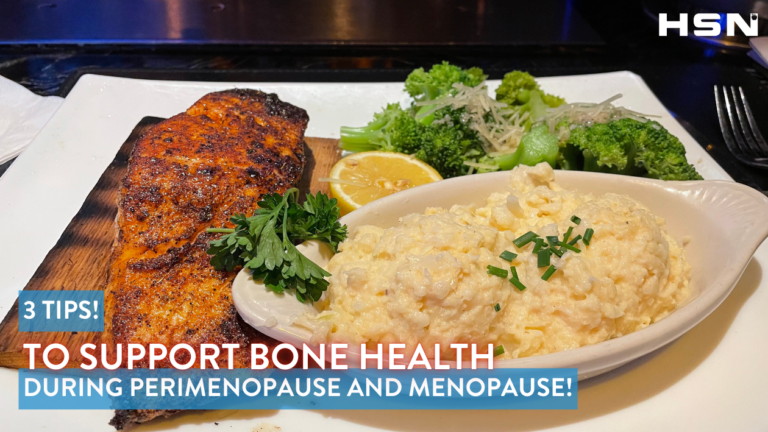Menopause marks a significant shift in a woman’s body, including a decline in estrogen levels. This hormonal change can have a profound impact on bone health. In the years surrounding menopause, women are at a heightened risk of osteoporosis, a condition characterized by weakened bones that are more susceptible to fractures. It’s estimated that during this time, women can lose up to 10% – 20% of their bone density, making it essential to prioritize bone health to reduce the risk of fractures and maintain overall well-being.
Healthy Steps Nutrition Dietitian Amanda Haar is passionate about hormone health and helping ladies transition. In this blog post we will provide some tips to help retain the bone density that is vital every year of life.

What Is Bone Density?
Bone density is a measure of how strong and dense your bones are. It’s determined by the amount of mineral content, primarily calcium and phosphorus, in your bones.
Higher bone density means your bones are stronger and less likely to fracture. Lower bone density increases the risk of osteoporosis, a condition where bones become weak and brittle.
Several factors can influence bone density, including:
Age: Bone density naturally decreases with age, especially after menopause in women.
Gender: Women generally have lower bone density than men.
Diet: A diet rich in calcium and vitamin D is essential for healthy bones.
Lifestyle: Regular exercise, especially weight-bearing activities, can help maintain bone density.
Genetics: Hereditary factors can also play a role.
Tips To Reduce Bone Loss And Increase Bone Density

Tip #1 – Look the habits and conditions that decrease bone health
High alcohol intake
Certain medications, including corticosteroids, antidepressants, and PPIs (typically taken for GERD)
Eating disorders
A history of amenorrhea
Total hysterectomy, including removal of ovaries
Tip #2 – Eat a sufficient amount of nutrient-dense foods, vitamin D, calcium and adequate protein
Following the plate method and eating the rainbow is a great way to ensure you are getting a variety of nutrients and enough protein into your body.
Deficiencies in Vitamin D, Calcium, zinc, Vit K2, Mg, or protein can lead to a loss in bone mass.
It’s important to get screened by a doctor or registered dietitian for these vitamins and minerals to test the levels in your body.
From there, work with a registered dietitian or nutrition coach to help you learn how to eat a balanced diet including proteins, non starchy carbs, and healthy fats.
Tip #3 – Exercise regularly

Activities that strengthen muscles and bones, such as strength training, walking, jogging, dancing, and functional training are great exercises to add into your daily routine.
If you are worried about going to a gym, go for a walk instead. Walking is a load bearing exercise and can help maintain strong healthy bones as long as your are eating the correct nutrients.
Bone Density Test And Supplements
A bone density test is a medical procedure used to measure the mineral content of your bones. It helps determine how strong or weak your bones are and your risk of osteoporosis.
There are two main types of bone density tests:
Dual-energy X-ray absorptiometry (DEXA): This is the most common and accurate method. It uses low-dose X-rays to measure bone density in your spine and hip.
Quantitative ultrasound (QUS): This test uses sound waves to measure bone density in your heel. It’s less accurate than DEXA but can be a screening tool.
Your doctor will recommend the best test for you based on your age, risk factors, and medical history.
Supplements
If after your screening for bone health and mineral levels you find you are low in certain nutrients, supplementation can be considered.
At Healthy Steps Nutrition we partner with Thorne. By following this link you will get 10% off of the supplements on our “HSN Dietitian Preferred Supplement Page”. Read all about Thorne‘s mission to help extend their lifespan and their scientific approach to wellness.
Wrap Up
As you can see, perimenopause and menopause can significantly impact bone health. By understanding the risks and taking proactive steps, you can help maintain strong bones and reduce your risk of osteoporosis.
Incorporating regular weight-bearing exercises, consuming a healthy balanced diet, adequate calcium and vitamin D, and considering supplements as needed can all contribute to optimal bone health throughout menopause and beyond. Consult with your healthcare provider to discuss your specific needs and create a personalized plan to support your bone health





